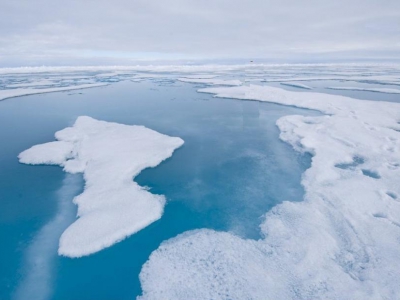Summary Report of the EPPR Group to increase knowledge of risks in the area
The EPPR Group (Emergency Prevention Preparedness and Response Group) has issued a summary report including its recommendations on how to prevent marine oil pollution in the Arctic Region to contribute to safer operations and to increase knowledge of Arctic- specific risks and possible mitigation measures.
Hazardous ice detection, forecasting and monitoring
In order to improve the detection and forecasting of hazardous sea ice in areas of offshore oil and gas operations and shipping, it is recommended that Arctic Council states cooperate to improve the hazardous ice detection and monitoring programs for Arctic waters. This includes satellite services, and the production and dissemination of icemaps in real time. It is also recommended that the Arctic Council expand the investigation into the use of Unmanned Aerial Vehicles(UAV) in the Arctic to include monitoring ice conditions in major Arctic shipping lanes and providing operational support for oil spill response.
Standards for Arctic oil and gas activities
International standards bring social and economic benefits by fostering the harmonization of specifications and practices. Standards are relevant to Arctic operations as the Arctic Council jurisdictions share similar operating environments. It is recommended that the Arctic Council catalog all applicable oil and gas standards for Arctic activities (e.g.: facilities, ice management, escape route and drills, training, logistics, security) and highlight differences in the standards. This will provide states an opportunity to learn from practices in other jurisdictions and possibly apply them in their own region.
Circumpolar marine environment risk assessment
It is recommended that the Arctic Council inventory existing risk assessments in the Arctic, identify common elements and environmental differences, as well as methodologies for under taking these activities, and conduct a circumpolar marine environment risk assessment,if appropriate, in order to better link the sensitivities of the Arctic marine environment with scientific calculations on risks caused by shipping and offshore oil and gas activities in the Arctic Ocean both presently and in the future.
Facilitate oil spill prevention research and regulatory cooperation
It is recommended that the Arctic Council establish a mechanism whereby regulators are able to share information on best practices,processes, regulatory approaches as well as compliance and operational information (e.g. near-miss data). Analysis of identified trends can be undertaken and various data collection done in an effort to identify Arctic specific prevention practices while fostering circumpolar collaboration through the pooling of resources. The initial results of this initiative could include the creation of a joint database and regular meetings of regulators.Over time, it has the potential to develop into an Arctic Oil Pollution Prevention Centre of Excellence.
Ensure appropriate infrastructure is in place for emerging Arctic shipping lanes
To ensure safe development and mapping of emerging Arctic shipping lanes in order to prevent oil pollution incidents, it is recommended that the Arctic Council conduct an analysis of existing and emerging shipping lanes, identify gaps in infrastructure and mapping, and work towards enhancing the safety of Arctic shipping lanes.
Further information may be found by reading the Summary Report issued by EPPR/ Arctic Council (please click at image below)
Also read:
Agreement on Cooperation on Marine OilPollution Preparedness and Response in theArctic































































